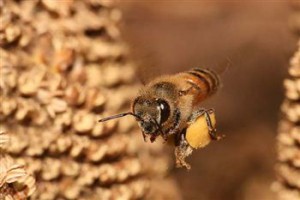
HONEY bees are using a special language to warn each other about threats to the hive, Scots scientists believe.
Researchers are eavesdropping on bees across Scotland in the hope that decoding the language could help reverse years of drastic population decline.
About 100 hives have been wired for sound in a £2m experiment being carried out by scientists at the Dundee University.
Beekeepers are struggling to deal with a mysterious syndrome called colony collapse disorder, which has struck across the northern hemisphere.
Bee populations declined by as much as 17% in some areas of the UK over the winter, puzzling scientists who believed a cold winter and early spring favoured the insects.
Dr Chris Connolly, a neuro-scientist at Dundee, said the noises made by bees appeared to act as an early-warning signal.
It appears bees make a roaring noise when they have lost their queen and become very noisy at night when attacked by the nosema bacteria which is thought to have destroyed entire colonies.
Bees live in social communities of as many as 60,000 insects so rapid and efficient communication is essential.
Dr Connolly said: “They make a whole range of frequencies of noise. Do they have words or phrases to indicate that they have got an infection, or they are hungry, or haven’t got a queen?”
He added: “The idea is to record the sounds from lots of different bees and if it transpires that all the bees are making a certain type of noise when they have, say, nosema infections, that would be very interesting.”
As well as the honey they produce, the bees help make an estimated £250m contribution to the UK economy annually by pollinating crops.
The researchers are listening in to bee talk using monitors which look like small mobile phones and send the sounds to a central computer.
Enid Brown, a beekeeper from Kinross, said her own experience suggested honey bees used their own language.
She said: “You can tell whether a hive is happy or not, or whether they are making an angry noise. The tone definitely changes.
“If this research is going to help the bees then it’s definitely worth taking part.”
Nigel Southworth, editor of Scottish Beekeeper magazine, said it was an “exciting project” and that Scottish beekeepers were playing an essential role in monitoring the health of honey bees.
Bees are already known to communicate with each other using physical movements known as the waggle dance.
After foraging, they use the dance to indicate to bees whether food is near or far away.
Theories of the decline of bee populations include damage caused by a parasite called the varroa mite, pesticide use, lack of food, and even radiation from mobile phone masts.

